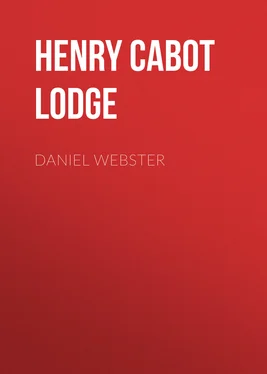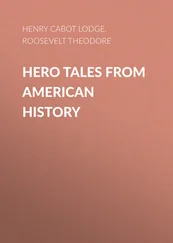Henry Cabot Lodge - Daniel Webster
Здесь есть возможность читать онлайн «Henry Cabot Lodge - Daniel Webster» — ознакомительный отрывок электронной книги совершенно бесплатно, а после прочтения отрывка купить полную версию. В некоторых случаях можно слушать аудио, скачать через торрент в формате fb2 и присутствует краткое содержание. Жанр: Биографии и Мемуары, История, foreign_edu, foreign_antique, foreign_prose, на английском языке. Описание произведения, (предисловие) а так же отзывы посетителей доступны на портале библиотеки ЛибКат.
- Название:Daniel Webster
- Автор:
- Жанр:
- Год:неизвестен
- ISBN:нет данных
- Рейтинг книги:5 / 5. Голосов: 1
-
Избранное:Добавить в избранное
- Отзывы:
-
Ваша оценка:
- 100
- 1
- 2
- 3
- 4
- 5
Daniel Webster: краткое содержание, описание и аннотация
Предлагаем к чтению аннотацию, описание, краткое содержание или предисловие (зависит от того, что написал сам автор книги «Daniel Webster»). Если вы не нашли необходимую информацию о книге — напишите в комментариях, мы постараемся отыскать её.
Daniel Webster — читать онлайн ознакомительный отрывок
Ниже представлен текст книги, разбитый по страницам. Система сохранения места последней прочитанной страницы, позволяет с удобством читать онлайн бесплатно книгу «Daniel Webster», без необходимости каждый раз заново искать на чём Вы остановились. Поставьте закладку, и сможете в любой момент перейти на страницу, на которой закончили чтение.
Интервал:
Закладка:
At no time in his life does Mr. Webster's character appear in a fairer or more lovable light than during this winter at Fryeburg. He took his own share in the sacrifices he had done so much to entail, and he carried it cheerfully. Out of school hours he copied endless deeds, an occupation which he loathed above all others, in order that he might give all his salary to his brother. The burden and heat of the day in this struggle for education fell chiefly on the elder brother in the years which followed; but here Daniel did his full part, and deserves the credit for it.
He was a successful teacher. His perfect dignity, his even temper, and imperturbable equanimity made his pupils like and respect him. The survivors, in their old age, recalled the impression he made upon them, and especially remembered the solemn tones of his voice at morning and evening prayer, extemporaneous exercises which he scrupulously maintained. His letters at this time are like those of his college days, full of fun and good humor and kind feeling. He had his early love affairs, but was saved from matrimony by the liberality of his affections, which were not confined to a single object. He laughs pleasantly and good-naturedly over his fortunes with the fair sex, and talks a good deal about them, but his first loves do not seem to have been very deep or lasting. Wherever he went, he produced an impression on all who saw him. In Fryeburg it was his eyes which people seem to have remembered best. He was still very thin in face and figure, and he tells us himself that he was known in the village as "All-eyes;" and one of the boys, a friend of later years, refers to Mr. Webster's "full, steady, large, and searching eyes." There never was a time in his life when those who saw him did not afterwards speak of his looks, generally either of the wonderful eyes or the imposing presence.
There was a circulating library in Fryeburg, and this he read through in his usual rapacious and retentive fashion. Here, too, he was called on for a Fourth of July oration. This speech, which has been recently printed, dwells much on the Constitution and the need of adhering to it in its entirety. There is a distinct improvement in his style in the direction of simplicity, but there is no marked advance in thought or power of expression over the Hanover oration. Two months after delivering this address he returned to Salisbury and resumed the study of the law in Mr. Thompson's office. He now plunged more deeply into law books, and began to work at the law with zeal, while at the same time he read much and thoroughly in the best Latin authors. In the months which ensued his mind expanded, and ambition began to rise within him. His horizon was a limited one; the practice of his profession, as he saw it carried on about him, was small and petty; but his mind could not be shackled. He saw the lions in the path plainly, but he also perceived the great opportunities which the law was to offer in the United States, and he prophesied that we, too, should soon have our Mansfields and Kenyons. The hand of poverty was heavy upon him, and he was chafing and beating his wings against the iron bars with which circumstances had imprisoned him. He longed for a wider field, and eagerly desired to finish his studies in Boston, but saw no way to get there, except by a "miracle."
This miracle came through Ezekiel, who had been doing more for himself and his family than any one else, but who, after three years in college, was at the end of his resources, and had taken, in his turn, to keeping school. Daniel went to Boston, and there obtained a good private school for his brother. The salary thus earned by Ezekiel was not only sufficient for himself, but enabled Daniel to gratify the cherished wish of his heart, and come to the New England capital to conclude his professional studies.
The first thing to be done was to gain admittance to some good office. Mr. Webster was lucky enough to obtain an introduction to Mr. Gore, with whom, as with the rest of the world, that wonderful look and manner, apparent even then, through boyishness and rusticity, stood him in good stead. Mr. Gore questioned him, trusted him, and told him to hang up his hat, begin work as clerk at once, and write to New Hampshire for his credentials. The position thus obtained was one of fortune's best gifts to Mr. Webster. It not only gave him an opportunity for a wide study of the law under wise supervision, but it brought him into daily contact with a trained barrister and an experienced public man. Christopher Gore, one of the most eminent members of the Boston bar and a distinguished statesman, had just returned from England, whither he had been sent as one of the commissioners appointed under the Jay treaty. He was a fine type of the aristocratic Federalist leader, one of the most prominent of that little group which from the "headquarters of good principles" in Boston so long controlled the politics of Massachusetts. He was a scholar, gentleman, and man of the world, and his portrait shows us a refined, high-bred face, suggesting a French marquis of the eighteenth century rather than the son of a New England sea-captain. A few years later, Mr. Gore was chosen governor of Massachusetts, and defeated when a candidate for reëlection, largely, it is supposed, because he rode in a coach and four (to which rumor added outriders) whenever he went to his estate at Waltham. This mode of travel offended the sensibilities of his democratic constituents, but did not prevent his being subsequently chosen to the Senate of the United States, where he served a term with much distinction. The society of such a man was invaluable to Mr. Webster at this time. It taught him many things which he could have learned in no other way, and appealed to that strong taste for everything dignified and refined which was so marked a trait of his disposition and habits. He saw now the real possibilities which he had dreamed of in his native village; and while he studied law deeply and helped his brother with his school, he also studied men still more thoroughly and curiously. The professional associates and friends of Mr. Gore were the leaders of the Boston bar when it had many distinguished men whose names hold high places in the history of American law. Among them were Theophilus Parsons, Chief Justice of Massachusetts; Samuel Dexter, the ablest of them all, fresh from service in Congress and the Senate and as Secretary of the Treasury; Harrison Gray Otis, fluent and graceful as an orator; James Sullivan, and Daniel Davis, the Solicitor-General. All these and many more Mr. Webster saw and watched, and he has left in his diary discriminating sketches of Parsons and Dexter, whom he greatly admired, and of Sullivan, of whom he had a poor opinion professionally.
Towards the end of the year 1804, while Mr. Webster was thus pleasantly engaged in studying his profession, getting a glimpse of the world, and now and then earning a little money, an opening came to him which seemed to promise immediate and assured prosperity. The judges of his father's court of common pleas offered him the vacant clerkship, worth about fifteen hundred dollars annually. This was wealth to Mr. Webster. With this income he could relieve the family from debt, make his father's last years comfortable, and smooth Ezekiel's path to the bar. When, however, he announced his good luck to Mr. Gore, and his intention of immediately going home to accept the position, that gentleman, to Mr. Webster's great surprise, strongly urged a contrary course. He pointed out the possible reduction of the salary, the fact that the office depended on the favor of the judges, and, above all, that it led to nothing, and destroyed the chances of any really great career. This wise mentor said: "Go on and finish your studies. You are poor enough, but there are greater evils than poverty; live on no man's favor; what bread you do eat, let it be the bread of independence; pursue your profession, make yourself useful to your friends and a little formidable to your enemies, and you have nothing to fear." Mr. Webster, always susceptible to outside influences, saw the wisdom of this advice, and accepted it. It would have been well if he had never swerved even by a hair's breadth from the high and sound principles which it inculcated. He acted then without delay. Going at once to Salisbury, he broke the news of his unlooked-for determination to his father, who was utterly amazed. Pride in his son's high spirit mingled somewhat with disappointment at the prospect of continued hardships; but the brave old man accepted the decision with the Puritan stoicism which was so marked a trait in his character, and the matter ended there.
Читать дальшеИнтервал:
Закладка:
Похожие книги на «Daniel Webster»
Представляем Вашему вниманию похожие книги на «Daniel Webster» списком для выбора. Мы отобрали схожую по названию и смыслу литературу в надежде предоставить читателям больше вариантов отыскать новые, интересные, ещё непрочитанные произведения.
Обсуждение, отзывы о книге «Daniel Webster» и просто собственные мнения читателей. Оставьте ваши комментарии, напишите, что Вы думаете о произведении, его смысле или главных героях. Укажите что конкретно понравилось, а что нет, и почему Вы так считаете.












